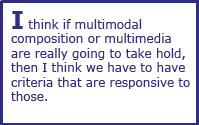KY: At the time the article was published in 1999, one of the things that seemed to be looming was a real interest in program assessment that was much more interested in the programmatic dimension of writing as opposed to assessing the work of the individual student. I talked about that a little bit, and I decided to cite the work of Pamela Moss who raised some interesting questions in an article in the journal Assessing Writing. She discussed how writing programs constructed students and the ways they either contributed to the development of students or might in fact have hindered them. I thought that was really smart, and, at that moment, my best guess was that's where the field would have gone.
| I have to say that almost seven years later, I don't think it's where the field has gone. What happens sometimes is that when a change really takes hold, it becomes ubiquitous, it becomes invisible, and it in some ways loses its power to frame a particular activity. |
|
My example here would be portfolios. There are a lot of people around the country who use portfolios for individual assessment, for classroom assessment, for assessment of programs, but, to my knowledge (I could be wrong), I don't know of a single case where people are looking seriously to see how students are constructed, with one exception. Tony Scott had a piece in the January 2005 issue of Written Communication that looked at what he considers to be the Foucauldian aspect of reflective pieces in the Kentucky statewide portfolio. In his case, Scott was looking at a high school model. I take his point, and I certainly think the potential is there. I don't agree completely with the conclusions, but that's the only such analysis that comes to mind. He wasn't actually looking at the whole program; he was looking at one text inside a portfolio, which is not the same thing as looking at a whole program. It doesn't seem that the field has gone there.
Where the field is going is often framed as “multimedia composition.” I say this on the basis of the kinds of articles that we're seeing in journals; I say this on the basis of the portraits of composition study that I've been working with (some of the survey data that I've seen); and I say this on the basis of the CCCC's research initiative, which just a year ago funded ten projects, over half of which were concerned with the role of technology and writing. I see this focus showing up in a lot of list-servs and in the WPA Outcomes Statement where there's a new effort to articulate some outcomes that are technology specific.
What's interesting in the context of assessment is that I don't see that the assessment piece is anywhere near where it needs to be in order to accommodate multimodal stuff. Carl Whithaus has a new book out that I have with me and I've started reading. It’s really a fun read and very interesting, but I'm not far enough along to see if it's going to give me what I need.
I did write a small piece for Computers and Composition where I talked a little bit about what I thought some new criteria might be. Kairos has some articles addressing the assessment of electronic texts. I certainly have new criteria when I use electronic portfolios, but I think if multimodal composition or multimedia (and those are not quite the same thing, in my view) are really going to take hold, then I think that we have to have criteria that are responsive to those. And we have precedents for this. When people moved from holistically scored essays to portfolios, we had to create new criteria. Whether or not a print paper had a thesis could not be used as a criterion for a portfolio. This is essentially the same kind of problem, and I think that we will solve it.
Actually, I think that these are the kinds of problems that are best solved by including our practice. That is to say, I think our work and practice help us figure out how to solve these issues. I don't think that those are the kinds of problems that can be solved theoretically. I don't think that's the way this kind of work functions.

